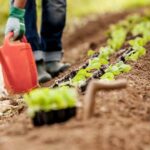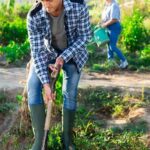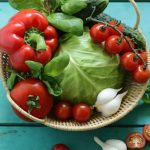Louisiana home vegetable gardening offers a unique and rewarding experience for residents looking to grow their own fresh produce. With the state’s rich history and favorable climate, cultivating a bountiful garden at home is not only feasible, but also deeply rooted in local traditions.
From the fertile soil to the warm and humid climate, Louisiana provides an ideal environment for a variety of vegetables to thrive. In this article, we will explore the ins and outs of Louisiana home vegetable gardening, from climate considerations to best practices for starting and maintaining your own garden.
When it comes to Louisiana home vegetable gardening, understanding the state’s specific climate and soil considerations is essential for success. From the humid subtropical climate to the diversity of soils across the state, there are several factors that contribute to which vegetables will grow best in your specific area. By considering these unique characteristics, you can tailor your garden to suit the conditions and maximize your chances of a successful harvest.
In this comprehensive guide, we will delve into the best vegetables to grow in Louisiana’s unique climate and provide valuable tips for starting a thriving home vegetable garden. Additionally, we will explore pest and disease management strategies specific to Louisiana gardens, as well as share success stories from fellow gardeners who have embraced the tradition of home vegetable gardening in the state.
Whether you are new to gardening or a seasoned pro, this guide aims to equip you with the knowledge and resources needed to create a flourishing vegetable garden right in your own backyard.
Climate and Soil Considerations for Louisiana Home Vegetable Gardening
When it comes to home vegetable gardening in Louisiana, understanding the climate and soil considerations is crucial for a successful harvest. Louisiana’s climate is characterized as subtropical, with hot and humid summers and mild winters, making it suitable for a wide variety of vegetables.
The average annual rainfall in Louisiana ranges from 55 inches in the northern part of the state to 65 inches in the southern coastal region, so it is important to consider water management when planning a home vegetable garden.
In terms of soil considerations, Louisiana is known for its diverse soil types, including clay, silt, sand, and loam. It’s important for home gardeners to test their soil to determine its pH level and nutrient content. Adding organic matter such as compost or well-rotted manure can improve soil structure and fertility, helping vegetables thrive in Louisiana’s unique soil conditions.
Additionally, the warm and humid climate in Louisiana can present challenges such as rapid evaporation of moisture from the soil and increased risk of plant diseases. To combat these issues, home vegetable gardeners should consider using mulch to retain moisture and prevent weeds, as well as practicing crop rotation to reduce the risk of disease buildup in the soil.
Overall, understanding the climate and soil considerations specific to Louisiana is essential for any aspiring home vegetable gardener in the state. By taking these factors into account and implementing appropriate strategies, gardeners can create an environment that supports healthy vegetable growth throughout the growing season.
Best Vegetables to Grow in Louisiana’s Unique Climate
When it comes to home vegetable gardening in Louisiana, it’s important to choose the right vegetables that can thrive in the state’s unique climate. The hot and humid weather, as well as the rich soil, provide an ideal environment for certain types of vegetables to grow successfully. Here are some of the best vegetables to consider planting in your Louisiana home vegetable garden:
- Okra: This heat-loving vegetable is a staple in Louisiana gardens. It thrives in the warm temperatures and can tolerate the humidity.
- Tomatoes: With proper care and maintenance, tomatoes can flourish in Louisiana’s climate. There are many varieties to choose from, such as Creole tomatoes which are well-suited for the region.
- Peppers: Both sweet and hot peppers do well in Louisiana. They love the heat and can add flavor to many of your favorite dishes.
- Collard Greens: These leafy greens are a popular choice for Louisiana home gardens. They are sturdy, heat-tolerant, and packed with nutrients.
- Eggplant: This versatile vegetable grows prolifically in Louisiana’s climate and is a favorite in many local recipes.
In addition to these vegetables, other suitable options for Louisiana home vegetable gardening include cucumbers, squash, sweet potatoes, and southern peas. When selecting what to plant in your garden, be sure to take into account not only the climate but also your personal preferences and culinary needs.
Successfully growing vegetables in this region involves selecting varieties that are well-suited for the environmental conditions and properly caring for them throughout their growth cycle. By choosing vegetables that are compatible with Louisiana’s unique climate, you can set yourself up for a bountiful harvest from your home garden.
Tips for Starting a Louisiana Home Vegetable Garden
Starting a Louisiana home vegetable garden can be a rewarding and fulfilling experience for residents looking to cultivate their own fresh produce. Before diving into the gardening process, there are several tips that can help ensure a successful and bountiful harvest.
First, it’s crucial to consider the unique climate and soil conditions in Louisiana. The state experiences hot and humid summers, which can impact the growth of certain vegetables. It’s important to choose vegetables that thrive in these conditions, such as tomatoes, okra, peppers, and sweet potatoes. Additionally, Louisiana soil tends to be acidic, so it’s essential to test the pH levels and make necessary amendments to ensure optimal growing conditions.
Another important tip for starting a Louisiana home vegetable garden is proper planning and layout. Consider the available space for gardening and choose a spot that receives at least 6-8 hours of sunlight per day. Take into account any potential obstacles such as trees or buildings that may cast shade on the garden area. Additionally, consider using raised beds or containers if the soil quality in your area is poor.
Lastly, novice gardeners in Louisiana should start with easy-to-grow vegetables such as cucumbers, squash, and green beans before attempting more challenging crops. It’s also helpful to connect with local gardening groups or extension offices for advice specific to Louisiana home vegetable gardening. By following these tips, aspiring gardeners can set themselves up for success when starting a home vegetable garden in Louisiana.
Overall, taking the time to learn about the specific considerations for Louisiana home vegetable gardening will ultimately lead to a more fruitful and enjoyable experience for residents eager to grow their own fresh produce right at home.
Pest and Disease Management for Louisiana Home Vegetable Gardens
Pests and diseases can be a major challenge for Louisiana home vegetable gardeners. The hot and humid climate in Louisiana creates the perfect environment for a wide range of pests and diseases to thrive. However, with the right knowledge and strategies, gardeners can effectively manage these issues and ensure a bountiful harvest.
One of the best ways to prevent pest infestations and disease outbreaks in your Louisiana home vegetable garden is to start with healthy soil. Conduct a soil test to determine the pH level and nutrient content of your soil, and make any necessary amendments to create optimal growing conditions for your vegetables. Healthy plants are better equipped to resist pests and diseases.
Another important aspect of pest and disease management in Louisiana home vegetable gardening is practicing good garden hygiene. Remove any dead or diseased plant material promptly, as it can harbor pests and pathogens. Regularly clean your garden tools, pots, and containers to prevent the spread of diseases. It’s also essential to rotate crops each season to help prevent the buildup of pests and diseases that target specific plant families.
Using natural pest management methods, such as introducing beneficial insects or using organic insecticides, can also be effective in controlling pest populations. Additionally, practicing companion planting by interplanting vegetables with flowers or herbs that repel pests can help protect your vegetable garden from infestations. By being proactive about pest and disease management, Louisiana home vegetable gardeners can enjoy a thriving garden throughout the growing season.
| Aspect | Details |
|---|---|
| Healthy Soil | Conduct a soil test for pH level and nutrient content; Make necessary amendments for optimal growth |
| Garden Hygiene | Remove dead or diseased plant material promptly; Clean tools, pots, containers regularly; Rotate crops each season |
| Natural Pest Management | Use beneficial insects or organic insecticides; Practice companion planting with flowers or herbs that repel pests |
Louisiana Home Vegetable Garden Success Stories
From New Orleans to Shreveport
Home vegetable gardening in Louisiana is not only a popular pastime, but also a source of pride for many residents. From the urban gardens of New Orleans to the rural plots in Shreveport, people throughout the state are finding success with their home vegetable gardens.
In New Orleans, urban gardeners have transformed vacant lots and rooftops into thriving vegetable gardens, providing fresh produce to their communities. In Shreveport, residents are embracing the farm-to-table movement by growing their own vegetables and sharing their abundance with neighbors and local food banks.
Community Gardens
In addition to individual success stories, Louisiana is also home to numerous community gardens that are making a positive impact on local neighborhoods. These communal spaces allow residents to come together to grow a variety of vegetables, fostering a sense of unity and cooperation within the community. Community gardens are not only providing fresh produce for participants, but they’re also serving as educational resources for novice gardeners who want to learn from experienced growers.
Innovative Techniques
Many Louisiana home vegetable gardeners are embracing innovative techniques to maximize their yields and overcome the challenges of the state’s unique climate. From using raised beds and vertical gardening methods to implementing drip irrigation systems and shade structures, these resourceful gardeners are finding creative solutions to grow healthy and productive vegetable gardens in Louisiana.
By sharing their experiences and knowledge with fellow gardeners, they are contributing to a culture of collaboration and continual improvement within the state’s home vegetable gardening community.
These success stories serve as inspiration for both novice and experienced home vegetable gardeners in Louisiana. Through experimentation, perseverance, and a willingness to adapt to the region’s specific conditions, these individuals and communities have proven that it is possible not only to grow thriving vegetable gardens in Louisiana but also to foster connections among neighbors through the shared love of gardening.
How to Maintain and Harvest a Thriving Louisiana Home Vegetable Garden
Maintaining a thriving Louisiana home vegetable garden requires consistent care and attention to ensure a bountiful harvest. From watering to fertilizing, and controlling pests and diseases, here are some essential tips for maintaining and harvesting a successful vegetable garden in Louisiana.
Watering and Soil Management
In Louisiana, where the climate can be hot and humid, proper watering is crucial for the health of your vegetable garden. It’s important to water deeply and less frequently to encourage deep root growth. Consider using drip irrigation or soaker hoses to deliver water directly to the roots while minimizing moisture on the foliage, which can lead to disease problems. Additionally, adding organic mulch to the soil helps retain moisture, suppress weeds, and improve soil structure.
Fertilizing
Regular fertilization is necessary to ensure that your vegetable plants have the nutrients they need for healthy growth and abundant production. Conduct a soil test before planting to determine any nutrient deficiencies and adjust your fertilization plan accordingly. Organic options like compost, manure, and fish emulsion are great for building soil fertility while minimizing environmental impact.
Harvesting
Harvesting at the right time is crucial for enjoying the best flavor and nutritional value from your homegrown vegetables. Different vegetables have different indicators of readiness for harvest-such as color, size, texture, or maturity stage-so it’s important to familiarize yourself with each crop’s specific harvesting guidelines. Be sure to use clean, sharp tools when harvesting vegetables to minimize damage to the plants.
By following these maintenance tips, you can enjoy a successful harvest from your Louisiana home vegetable garden while contributing positively towards environmental sustainability through organic gardening practices that minimize chemical inputs.
Resources for Louisiana Home Vegetable Gardeners
As a Louisiana home vegetable gardener, it’s important to have access to reliable resources that can help you succeed in growing your own produce. Luckily, there are many resources available specifically for Louisiana gardeners that can provide guidance, support, and valuable information. Here are some key resources that can be beneficial for anyone looking to start or improve their home vegetable garden in Louisiana:
- LSU AgCenter: The LSU Agricultural Center offers a wealth of information on gardening, including specific recommendations for Louisiana’s climate and soil conditions. Their website provides guides, publications, and even webinars on home vegetable gardening.
- Local Cooperative Extension Offices: Many parishes in Louisiana have local cooperative extension offices that offer workshops, classes, and one-on-one assistance for home gardeners. These offices can also provide soil testing services to help you understand the specific needs of your garden.
- Community Gardens: Joining a community garden in your area can be a great way to connect with other local gardeners and learn from their experiences. In addition to providing access to shared land and resources, community gardens often host events or workshops focused on sustainable gardening practices.
In addition to these specific resources, there are also numerous online forums and social media groups dedicated to Louisiana home vegetable gardening. Engaging with these communities can be a great way to ask questions, share tips, and connect with other like-minded individuals who are passionate about growing their own food in Louisiana.
Ultimately, by taking advantage of these resources and seeking out guidance from experienced growers in your area, you can increase your chances of success and enjoy the many benefits of home vegetable gardening in the unique environment of Louisiana.
Conclusion
In conclusion, Louisiana’s unique climate and soil conditions present both challenges and opportunities for home vegetable gardening. With the right knowledge and resources, residents can successfully grow a wide variety of vegetables right in their own backyard. Embracing the rich tradition of home vegetable gardening in Louisiana not only provides fresh, healthy produce for the family but also connects individuals to their roots and the state’s agricultural heritage.
For those considering starting a home vegetable garden in Louisiana, it’s important to carefully consider the climate and soil conditions. Choosing the best vegetables for this unique environment is crucial for success, along with implementing effective pest and disease management strategies. By following the tips provided and learning from successful gardening stories in the state, aspiring gardeners can create a thriving Louisiana home vegetable garden of their own.
By maintaining and harvesting a thriving home vegetable garden, Louisianans can enjoy the satisfaction of producing their own food while also contributing to sustainable living practices. The numerous resources available to Louisiana home vegetable gardeners provide guidance and support as they embark on this fulfilling journey. With dedication, perseverance, and a love for gardening, anyone can embrace the rich tradition of home vegetable gardening in Louisiana.
Frequently Asked Questions
What Are the Best Garden Vegetables for Louisiana?
The best garden vegetables for Louisiana include okra, tomatoes, bell peppers, sweet potatoes, and cucumbers. These are well-suited to the hot and humid climate of the state and thrive in its rich soil.
When Should I Start Planting My Garden in Louisiana?
In Louisiana, planting your garden typically starts in late February or early March. This timing allows the vegetables to mature before the intense heat of summer arrives. However, always check your specific plant’s requirements for the best results.
What Are the Easiest Vegetables to Grow in Your Home Garden?
Some of the easiest vegetables to grow in your home garden include tomatoes, lettuce, green beans, radishes, and zucchini. These plants are relatively low-maintenance and can be grown in containers or directly in the ground with minimal effort.

If you’re looking to get into vegetable gardening, or are just looking for some tips on how to make your current garden better, then you’ve come to the right place! My name is Ethel and I have been gardening for years. In this blog, I’m going to share with you some of my best tips on how to create a successful vegetable garden.





